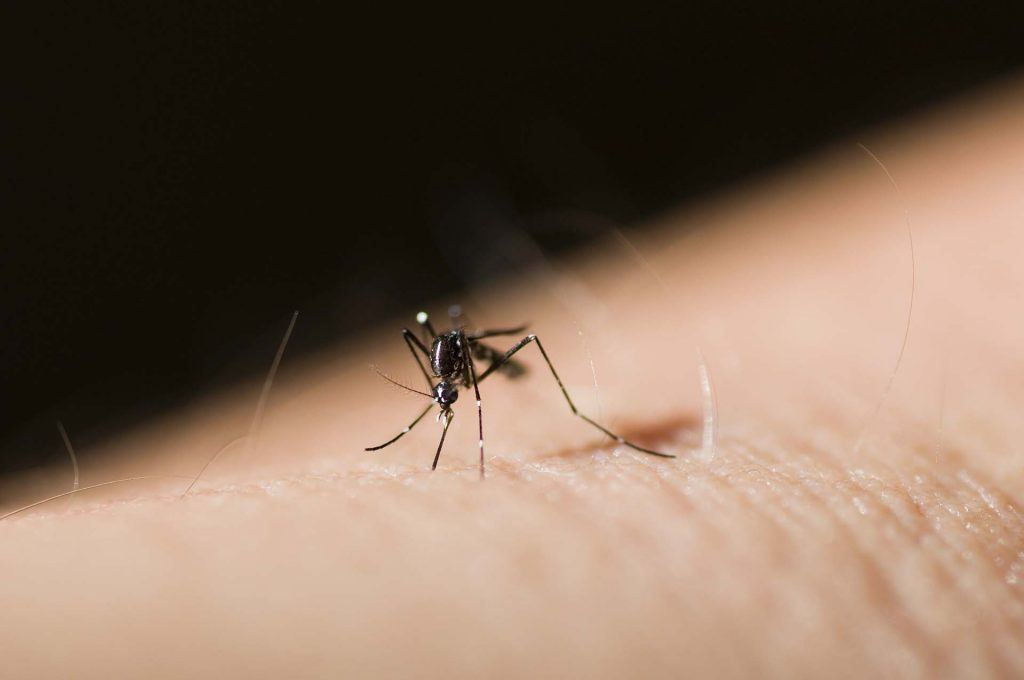Ah, summertime: long days, lots of time in the outdoors, and inevitably pesky bugs! If the bugs like to munch on you, you’re probably looking for solutions to the itching and maybe even the pain and swelling as well.
We understand the frustration of both preventing bugs and dealing with bites. I spent most of my young life layering on the Cutter or Off! and taking Benadryl for post-bite irritation, but essential oils offer a viable alternative to all of that without the toxicity. And we’re all here because we care about natural living and reducing toxic ingredients in our lives, right?
In this article, we’ll show you exactly how to use essential oils to treat itchy bug bites, including which essential oils are the most effective for some common types of bug bites.
Table of Contents
Best Essential Oils for Bug Bites
As with most remedies in the essential oil world, there is a lot of speculation regarding which oils are actually effective for certain purposes or conditions. There have been very few controlled studies that definitively prove that certain essential oils can reduce the effects of bug bites. However, anecdotal evidence is not something to be totally disregarded! Here is a list of a few oils that have some evidence backing their efficacy; scientific or anecdotal.
Clove Essential Oil
Clove essential oil has anecdotal evidence supporting its use as a treatment post-mosquito bite, but what is particularly intriguing about clove essential oil is its proven efficacy at repelling those nasty gnats!
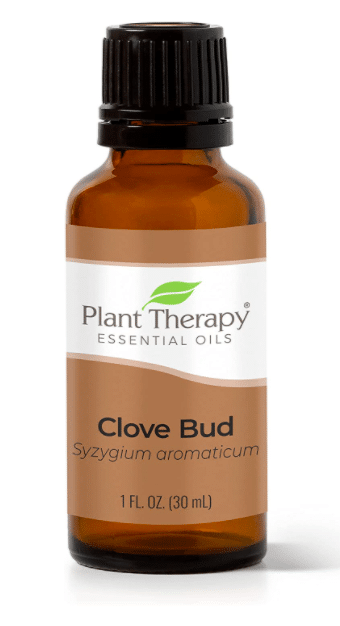
In one study, Clove essential was combined into two separate blends with thyme essential oil and geranium essential oil. Both oil blends prevented the subject from being bit by insects for an average time span of 1.25-2.5 hours.
How to Use
The study did note that users can be irritated by clove essential oil when used topically and suggested patch testing if a reader plans to try these oil blends on themselves. The researchers tested the blends at a concentration of 10-25%.
Lemongrass Essential Oil
Lemongrass essential oil is another essential oil on the lineup that is commonly touted as an itch-curing tonic but there is no scientific research mentioned in their reviews. Keeping this in mind, lemongrass is said to help with itchy bug bites.
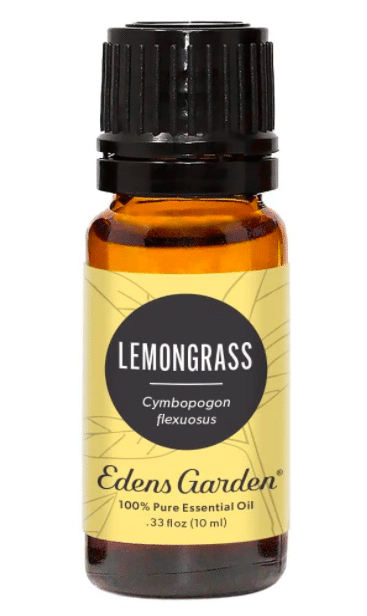
What is backed by science are lemongrass’s antibacterial properties. There are several strains of bacteria that lemongrass essential oil has been tested against and proven effective at reducing and/or killing completely. So it may or may not help you with the itch, but it is more than likely to help you out with any potential bacteria that could enter the wound!
How to Use
For topical application, add 2-3 drops of lemongrass oil and 1/4 of a cup of witch hazel into a spray bottle, shake well, perform a small patch test if you are new to this oil or to witch hazel, and then spritz it on the affected area.
Helichrysum Essential Oil
If you haven’t heard of this essential oil, that’s because it is extremely rare. This essential oil has some research regarding its anti-inflammatory properties, so it’s a safe bet that you may experience these effects on a swollen bug bite!
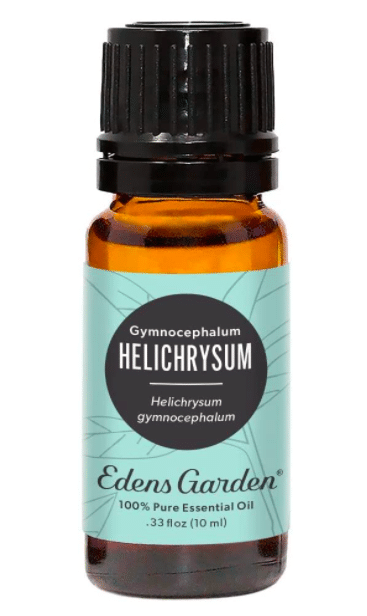
The anti-inflammatory activity of this essential oil was proven in vitro in a study on rats (basically meaning that it hasn’t been tested in human trials yet), so there is more research to be done on this super rare oil.
How to Use
For topical application, diffuse a few drops of this oil in a diffuser or dilute 2-3 drops in a carrier oil such as jojoba oil or coconut oil. Be sure to patch test first to make sure that you don’t experience an adverse reaction.
Lavender Essential Oil
Not only does lavender help calm you down, but you can also use this essential oil to reduce itching from bug bites! And yep, this one has science to back it!
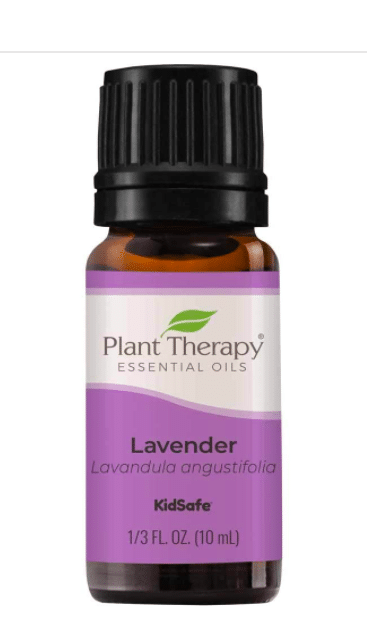
Although no essential oil is extensively researched, the study featuring lavender as an anti-itch aid took note of its effects on certain chemicals that the body produces that make us itch. Individuals treated with lavender oil showed reduced levels of the itch chemicals, quantitatively demonstrating what lavender can do!
How to Use
Diffuse 3-4 drops in 100ml of water or dilute 2-3 drops in 2-5 percent of a carrier oil such as sweet almond oil or jojoba oil and rub it on those nasty bug bites to provide some itch relief.
As always, please perform a small patch test if you are new to this oil or have sensitive skin before applying it all over the affected area.
Tea Tree Essential Oil
Tea Tree oil is another essential oil that is a commonly known itch-reliever. There isn’t any information that directly links tea tree essential oil to treating itching or bug bites, but we do see research that this powerful oil is known as an antiseptic, anti-fungal, and even an antibacterial agent .
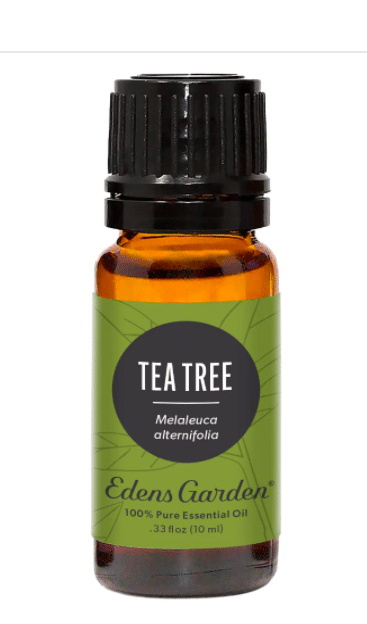
Precautions
However, the use of this oil for skin irritation like bug bites comes with a caveat. While tea tree oil has proven effective against skin irritations from allergies, it can also produce a rash in some individuals due to the potency of this essential oil.
Also, this oil, as many essential oils, cannot be ingested as it is poisonous when taken internally.
How to Use
For topical application, add 2 drops Tea tree oil to 3-5 percent of carrier oil like jojoba oil in order to reduce the chances of skin irritation. Perform a small patch test, then rub the mixture all over the itchy bug bite.
Peppermint Essential Oil
There are a few research studies that point toward peppermint essential oil being effective for itch relief in individuals with pruritus, so we can make the assumption that it might be effective for itch relief in general. There is no research directly on bug bites, but both studies showed statistically significant reductions in itching.
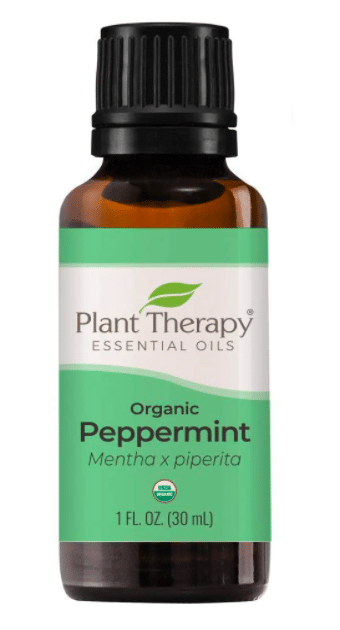
Additionally, if you have had an allergic reaction to certain types of insect bites peppermint oil may be especially helpful. Allergens like the chemicals that bugs transmit typically cause the production of histamines within the body, an inflammatory response that causes all of those pesky reactions like itchiness and hives.
Peppermint oil was found to reduce the number of histamines in rats with allergic rhinitis in a 2001 study.
How to Use
You can dilute 2-3 drops of peppermint essential oil with your favorite carrier oil and apply it topically to the affected area. You’ll also feel a nice cooling effect from the menthol that is present in peppermint essential oil, which can help with the inflammation from an insect bite or mosquito bite.
Chamomile Essential Oil
You might be surprised to see chamomile on the list of essential oils that can help with bug bites, but chamomile does more than just that.
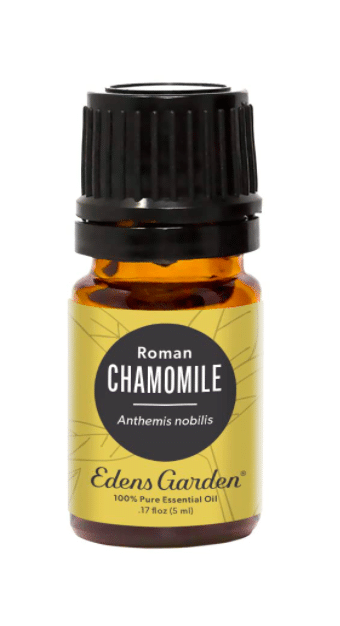
Chamomile is proven to be a topical anti-inflammatory with studies showing reduced irritation with the application of chamomile. Internally, chamomile has been shown to produce an increase in immune indicators with regular consumption, so you may even want to consider adding chamomile oil or chamomile tea into your daily routine!
How to Use
Aside from the benefits of itch relief, chamomile essential oil is a fantastic calming oil. Diffuse chamomile oil and lavender to get a great night’s sleep!
Basil Essential Oil
Basil essential oil is another oil on the list that doesn’t necessarily carry scientific backing for itch relief but is still touted as an effective treatment for bug bites by many essential oil users.
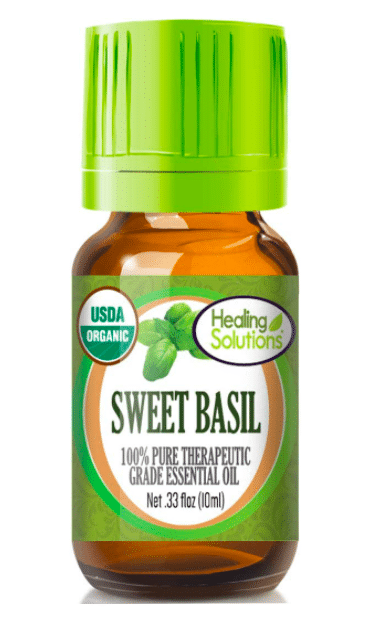
One reason why basil oil may be aiding in insect or bug bite relief is due to its scientifically proven anti-inflammatory properties. Particularly, the anti-inflammatory benefits of sweet basil oil.
How to Use
Add 2-3 drops to a carrier oil, perform a patch test, and then apply all over desired area. You can also diffuse 2-3 drops of this oil and 2 drops of lemongrass oil in 100 ml of water.
Home remedies for bug bites
We’ve reviewed the oils, now let’s put them to work! These are a few recipes that you can make at home to treat bug bites, prevent bug bites, or both!
Lavender Vinegar Bath
Ingredients:
- 1 cup apple cider vinegar or white wine vinegar
- 50 drops of lavender essential oil
Directions:
- Combine vinegar and lavender in your container of choice
- Shake to combine
- Shake well before each use
Treatment:
- Fill your tub with warm water
- Once filled add 6 tsp of your lavender vinegar to the tub
- Swirl the water to disperse the oil
- Soak for 30 minutes or longer if desired
- Massage any floating droplets of oil into your skin
Anti-Itch Body Wash
Ingredients:
- 2 tsp aloe vera gel
- 3 drops lavender essential oil
- 2 drops chamomile essential oil
- 1 drop bergamot essential oil
Directions:
- Combine your ingredients in a mason jar
- Shake well
- Shake well again before using
- After bathing, showering or washing use a cotton ball to apply your solution to the affected areas
Essential Oils for Different Situations
Below we take some of the essential oils listed above and offer recommendations for certain types of bugs. Please keep in mind that if you have a serious allergy to certain insect bites, it is important to seek professional medical help. These are not a substitute for life-saving treatments like an epi-pen.
Most effective for Itchy bug bites
If we’re talking about the itch factor, look no further than lavender or chamomile. As mentioned above, both of these essential oils have some scientific research behind them that proves that they can reduce inflammation and block histamines (the chemical stuff in your body that makes you want to scratch and causes inflammation). Not only will they help the itch, but they’ll also help you to be nice and calm.
Most effective for Mosquito bites
For dealing with mosquitos, we’re looking for something that is antimicrobial as well as anti-itch. Go for tea tree essential oil here, but use it with caution as this essential oil can be irritating to some individuals. Make sure that it is properly diluted and patch test first.
Most effective for Bee stings
Bees are the saviors of our environment and the reason for our existence, but dangit bee stings hurt! For this unfortunate interaction with these buzzing angels, try out some peppermint essential oil diluted. It will cool down the area that will likely become inflamed after you get the sting. If you develop major swelling in the area that doesn’t go down within 24 hours, get yourself to a medical professional ASAP.
Most effective for Spider Bites
Spiders are great for catching bugs, not so great if you get munched on by one. Some spiders are incredibly venomous, so consider the use of essential oils null and void in the case of life-threatening spider bites. For an encounter with the spider of the non-venomous variety, try out something that is anti-inflammatory and soothing like a lavender and peppermint combination. Dilute it and massage it into the affected area for best results.
Common Questions
In what ways can you use essential oils for bug bites?
Some state that diffusing essential oils can help with bug bites, but it really makes more logical sense that this would help with preventing bugs from making an appearance in the first place.
If you’re using essential oils after the fact, try an essential oil recipe listed above or dilute any combination of the essential oils listed above with your favorite carrier oil and apply topically to the affected area(s). Topical usage makes the most sense because it allows for the essential oils to be absorbed into the skin and do their best work on the affected areas!
Which essential oils are best for bug bites on toddlers?
Lavender oil is usually a safe oil to use on kids. Plant Therapy has a range of oils that are kid-safe, and lavender oil is part of that collection.
As always, make sure to properly dilute the oil with a carrier oil, and perform a small patch test before applying it all over the affected area.

